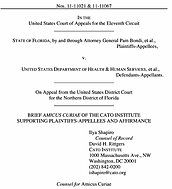Florida v. U.S. Dep’t of Health & Human Services
Learn more about Cato’s Amicus Briefs Program.
Obamacare is moving towards its inevitable date with the Supreme Court; although the pace may be aggravating, attorneys on both sides are strengthening their arguments and clarifying the issues presented. Cato’s latest brief, filed today in the Eleventh Circuit in support of 26 states and the National Federation of Independent Business, sharpens the position we already expressed in briefs filed in the Fourth Circuit and the Sixth Circuit. Our focus remains the question of whether the Constitution authorizes Congress to mandate that individuals purchase health insurance or suffer a fine. The government has subtly shifted its thinking at this stage, however, to argue that the individual mandate does not so much compel “inactive” citizens to act but merely regulates when and how health care is purchased. Everyone will eventually purchase health care, the argument goes, and the mandate requires that people pre‐pay for that care so they don’t shift the costs onto others. We point out how this argument is a spurious misdirection, an attempt to recharacterize the individual mandate in terms that are directly contrary to the purpose and function of the overall statute. Obamacare explicitly regulates the status of being uninsured — and not just those who seek to shift health care costs to the future or slough them onto taxpayers (indeed, the politically uncomfortable truth is that those most likely to incur health care expenses they cannot pay, the poor, are exempt from the mandate). We argue that, regardless of the spin that the government places on it, the individual mandate “regulates” inactivity, something that not even modern constitutional doctrine allows. The status of being uninsured cannot be transformed into economic activity via semantic prestidigitation; no matter how artfully articulated, a decision not to purchase insurance, or to do nothing, or to self‐insure, is not a federally regulable action. The outermost bounds of Congress’s power under the Commerce Clause, as exercised via the Necessary and Proper Clause, reach certain classes of intrastate economic activity that substantially affects interstate commerce. But Congress cannot reach inactivity even if it purports to act pursuant to a broader regulatory scheme. Allowing Congress to conscript citizens into economic transactions would not only be unprecedented — as government‐friendly the precedent is — but would fundamentally alter the relationship between the sovereign people and their supposed “public servants.” The individual mandate “commandeers the people” into the federal government’s brave new health care world.

This work is licensed under a Creative Commons Attribution-NonCommercial-ShareAlike 4.0 International License.





